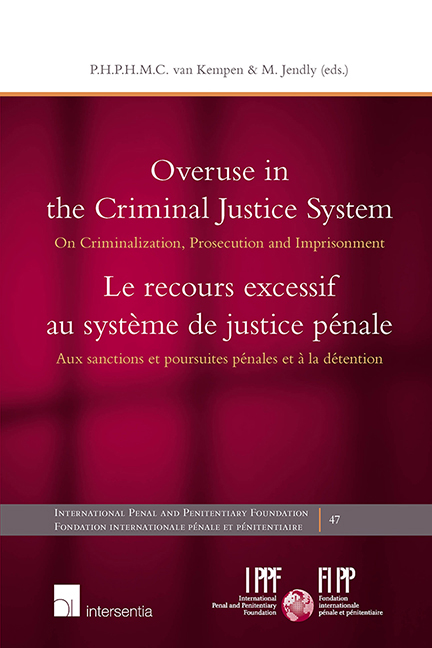Book contents
- Frontmatter
- Dedication
- Contents
- Acknowledgements
- Remerciements
- PART I INTRODUCTORY SYNTHESIS AND ANALYSES 1ÈRE PARTIE. SYNTHÈSE ET ANALYSES INTRODUCTIVES
- PART II THEMES 2ÈME PARTIE. THÈMES
- Overuse of the Criminal Justice System: Analytical Approach, Rules and Practices
- The Overuse of Criminal Justice in the Case Law of the European Court of Human Rights
- Overuse of Criminalization: a Philosophical and Political Approach on the Latin-American Situation
- Overprosecution and Negotiated Justice in Europe
- The American Experience with the Prosecutorial Overuse of Plea Bargaining
- Overuse of Imprisonment: Statistical Analyses of Incarceration Rates Across the World
- Minimising Prisonisation and the Harms of Custody
- Criminal Policy and Imprisonment. The Case of Lithuania: Open Prisons, Prison Leave and Release on Parole
- PART III NATIONAL REPORTS 3ÈME PARTIE. RAPPORTS NATIONAUX
- The International Penal and Penitentiary Foundation: history and purpose
- La Fondation internationale pénale et pénitentiaire: histoire et objectif
- The IPPF Series
The Overuse of Criminal Justice in the Case Law of the European Court of Human Rights
from PART II - THEMES 2ÈME PARTIE. THÈMES
Published online by Cambridge University Press: 26 June 2019
- Frontmatter
- Dedication
- Contents
- Acknowledgements
- Remerciements
- PART I INTRODUCTORY SYNTHESIS AND ANALYSES 1ÈRE PARTIE. SYNTHÈSE ET ANALYSES INTRODUCTIVES
- PART II THEMES 2ÈME PARTIE. THÈMES
- Overuse of the Criminal Justice System: Analytical Approach, Rules and Practices
- The Overuse of Criminal Justice in the Case Law of the European Court of Human Rights
- Overuse of Criminalization: a Philosophical and Political Approach on the Latin-American Situation
- Overprosecution and Negotiated Justice in Europe
- The American Experience with the Prosecutorial Overuse of Plea Bargaining
- Overuse of Imprisonment: Statistical Analyses of Incarceration Rates Across the World
- Minimising Prisonisation and the Harms of Custody
- Criminal Policy and Imprisonment. The Case of Lithuania: Open Prisons, Prison Leave and Release on Parole
- PART III NATIONAL REPORTS 3ÈME PARTIE. RAPPORTS NATIONAUX
- The International Penal and Penitentiary Foundation: history and purpose
- La Fondation internationale pénale et pénitentiaire: histoire et objectif
- The IPPF Series
Summary
INTRODUCTION
The relationship between human rights and criminal justice has long been considered to be particularly intricate. On the one hand, human rights law may promote change in the criminal justice machinery at both the domestic and international levels. On the other hand, unsuitable national criminal law or wrongful application of the applicable criminal law and procedure provisions may interfere with treaty obligations undertaken by States in respect of human rights. It is therefore of the utmost importance that the existing bond between human rights and criminal justice be clearly defined in the context of the administration of criminal justice so that the objectives of both can be harmonised within the democratic state.
In this context, the European Court of Human Rights (ECtHR) has played an important role as human rights adjudicator in the field of criminal law. An analysis of the Strasbourg case law on criminal matters reveals that the Convention obligations undertaken by the States are twofold: on one hand, the protection of the individual against the overuse of criminal justice and, on the other hand, the use of criminal law for the protection of the rights and freedoms of individuals and legal persons. The former Belgian Judge at the ECtHR, Francoise Tulkens, described these two aspects as the “the defensive role of human rights” and “the offensive role of human rights” in what she called “the paradoxical relationship between criminal law and human rights”.
This contribution aims at exploring the case law of the ECtHR in the light of the traditional “defensive role of human rights”, focusing on the overuse of criminal justice against the individual and, in particular, on the overuse of criminalisation and of imprisonment. In other words, this contribution will revisit some of the cases in which the Strasbourg Court has considered the criminalisation of an act and the recourse to imprisonment to be in breach of a Convention right.
OVERUSE OF CRIMINALISATION
A manifestation of the overuse of the criminal justice machinery can be first found at the legislative level. When considering the criminal approach to be adopted in relation to a specific conduct, the legislature should take into account that criminal law should only be used as a last resort when no other alternative to a criminal law measure exists.
- Type
- Chapter
- Information
- Overuse in the Criminal Justice SystemOn Criminalization, Prosecution and Imprisonment, pp. 67 - 82Publisher: IntersentiaPrint publication year: 2019

